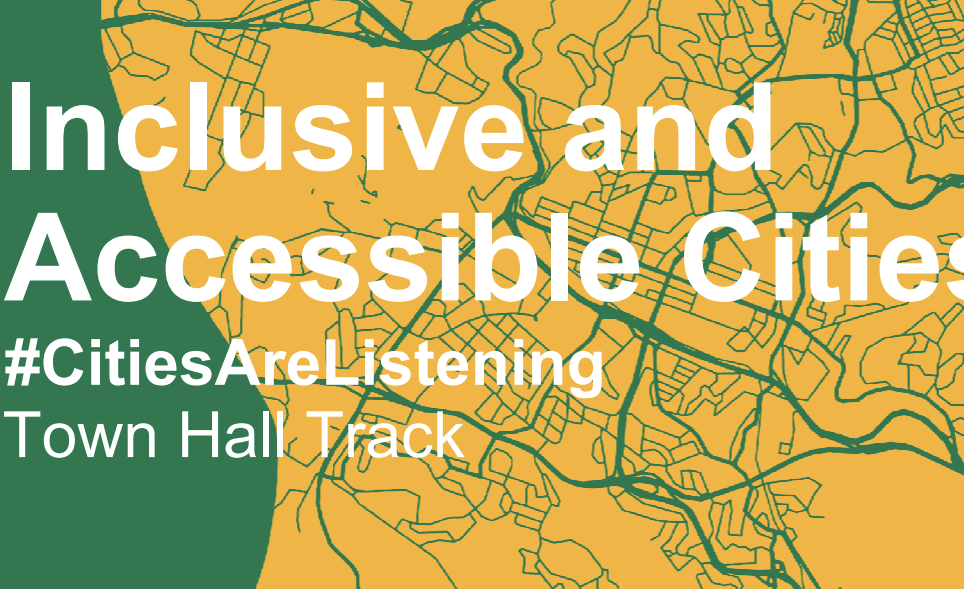Urbanization provides opportunities for social inclusion, equitable access to services and livelihoods, and engaging and mobilizing vulnerable populations at risk of exclusion, particularly for the 25% of global population experiencing daily barriers to their meaningful participation in cities.
Urbanization provides opportunities for social inclusion, equitable access to services and livelihoods, and engaging and mobilizing vulnerable populations at risk of exclusion, particularly for the 25% of global population experiencing daily barriers to their meaningful participation in cities. The following policy document provides recommendations and priority actions for local and regional governments and other urban stakeholders to build cities for all by structuring policies around non-discrimination, participation, accessibility, inclusive urban policies and programs, capacity development. It includes a proposed way forward that includes multi-stakeholder partnerships, systems wide assessment and generation of disaggregated data to inform and monitor inclusive urban development.
To operationalize the Leave No One Behind (LNOB) Principle, local and regional governments should structure their policies around inclusive human rights instruments and development frameworks including the Convention on the Rights of Persons with Disabilities, Sustainable Development Goals, the New Urban Agenda, and the WHO Age Friendly Cities and Communities Framework. In addition to these frameworks local and regional governments can tailor their objectives around six essential pillars for inclusion; namely:
1. Non-discrimination: calls attention to the principle to Leave No One Behind. Truly inclusive urban policy priorities mainstream equitable, affordable and safe access to physical, social and digital infrastructure across all urban planning objectives and programs to ensure the right to the city in all environments regardless of gender, age, disability and recognizes that all persons have a right to accessibility
2. Participation: local governments priorities must guarantee environments in which all stakeholders can actively engage, particularly stakeholders who face attitudinal barriers limiting their participation such as persons with disabilities and older persons, in the development inclusive urban and planning policies and programs. Participatory programs must guarantee socio economic equity through inclusive programs in education, hiring practices and legal, decent and productive employment.
3. Accessibility: Implementation of urban & rural strategies policies should prioritize accessibility as a measurable mechanism to guarantee participation and non-discriminatory environments. Prioritizing accessibility means as a first step addressing and the eliminating of barriers in the physical, digital and social environment of cities; a second measure will be the adjustments so that all persons are able to access the tools and information needed to understand and exercise their rights in the city, including to participate in public life. This includes the provision of inclusive services and tools, to facilitate access to public facilities, spaces, information, websites and online services.
4. Inclusive urban policies and programs: local and regional governments should harmonize and localize international, regional and national standards on accessibility regulations and legislation including the International Standards Organizations (ISO) 71:2014 Guide on Accessibility, ISO 21542, and Web Content Accessibility Guidelines 2.0. These standards provide a strong baseline of technical guidelines. Any translation of the standards should go above baseline and be done in direct consultation with accountable institutions and civil society, particularly persons with disabilities and older persons.
5. Capacity Building: local and regional governments should strengthen the community’s ability to engage directly in efforts to improve standards and accessibility of services facilities by promoting, developing and deploying capacity development that strengthen civil society’s influence in shaping inclusive governance processes and protecting human rights in urban and territorial decision making. Part of this capacitation includes actively supporting programs and research, through collaborations with universities and non-governmental organizations, that aim to develop and improve accessible technological mechanisms for inclusive sharing and exchanging of information, knowledge, expertise, training and mobility.
6. Data for Development: Towards effectively informing future programs and monitoring existing ones, local and regional governments should procure and utilize evidence based and inclusive data to systemically understand and address the barriers that limit inclusion and accessibility. Inclusive data is disaggregated by sex, age, disability type, income, geographic location, and migration status along with other characteristics that are relevant to the local context. Disaggregation should take place at all dimensions of the program: when #CitiesAreListening developing baselines, during the implementation and evaluation stage. local and regional governments should promote and utilize data to inform current and future planning for the city building on a shared knowledge and best practices on areas such as universal design and age friendly cities by comparing both international and locally generated data.

- See more information about the town hall track here.
- The complete policy papers about Inclusive and Accessible Cities here.
- Visit the official website about UCLG Congress here.
- Read the article that was published in EL PAIS newspaper about it.
